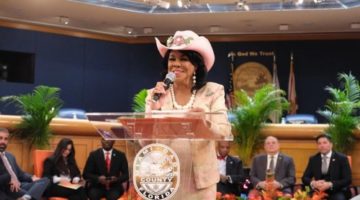 Miami was where it started: the easy financing of endless high-priced condos without a clue of who would actually buy them. Ninety thousand of them were built on paper; bought and traded in the Magic City before they were even completed.
Miami was where it started: the easy financing of endless high-priced condos without a clue of who would actually buy them. Ninety thousand of them were built on paper; bought and traded in the Magic City before they were even completed.
In the boomtown frenzy of quick cash and high flip rates, the entire housing market went crazy in the Sunshine State. Speculation got politicians drunk – Miami Mayor Manny Diaz was on the cover of magazines as his newfound economic engine heralded a renaissance of the city.
Ballooning property values fattened city and state budgets. With free-flowing campaign contributions from high developers, the governor, the GOP-controlled state Legislature, and the complacent Democrats went along with drastic tax cuts that everyone knew would be devastating when the bubble burst.
Meanwhile, low-income communities were the canaries in the coal mine. At the height of the bubble, low-income black and immigrant communities were crying out about the disaster underneath.
There was an affordable housing crisis by 2003, as home prices began skyrocketing and both state and private actors abandoned the preservation and production of low-income and moderate-income housing. More importantly, real income and real jobs were growing increasingly out of reach.
While developers and bankers threw champagne parties on South Beach to celebrate the newly glitzy towers downtown, the people of Liberty City, Overtown and East Little Havana had hit the downturn first.
Globalization has finally caught up to America. What's left is a hollow, de-industrialized economy in the heartland, and cities that were built on serving the global finance industry or producing media and entertainment that said it was all OK.
The only standing industry is the military, and even that is overstretched and not quite providing the spoils that the empire demands. For three decades, in rhetoric and in aggressive policy, the U.S. has championed neo-liberalism where governments around the world were forced to cut social programs and taxes to allow corporations to run amok.
And like in Miami, where developers were allowed to make mega profits without any investment back into community, where there was blind faith in the trickle-down theories, the world saw poverty deepen while the few that were connected to speculation got fat.
Some have called this casino capitalism, and for America the game may be up. The position of the American worker shows the dilemma of U.S. capitalism. As workers’ ability to make a living diminished, and social safety nets were cut, Americans’ actual buying power shrank.
Just as easy credit allowed for the creation of condos that nobody could afford, borrowing filled the void that real wages once provided. The federal government fueled and encouraged loose credit, and financial institutions happily followed, especially in working class communities that were strapped for cash.
American capitalism is in trouble. After decades of deregulation, union busting, destroying social services, and saying that there is no room for “big” government, the government is now going to spend more on the national financial bailout than any other government intervention ever; a $700 billion free welfare check for banks and insurance companies.
Yet, despite spending all that money, the government and, moreover, the public, are not going to own the banks. In other words, we are paying for nationalizing the financial industry without actually owning the assets that we’re buying.
It is time to flip the script.
Take that first $700 billion for the banks and double it. Make it $1 trillion, or more, which must be invested in the incomes of normal folks to spark the economy. Scrap the trickle-down philosophy that resulted in inflated CEO salaries while regular folks continue to suffer. Put the money directly in the hands of our people and our communities. It’s that simple.
Second, halt all home foreclosures and evictions. The mortgage crisis is the largest loss of wealth in communities of color, ever. Use the money to reestablish wealth in those communities through underwriting those empty homes and producing more housing in the urban core.
Third, and most fundamental to the long term, we must ground the economy in producing wealth and value. The emerging green economy can pave the way to producing wealth again.
It is a way out of the double crisis we are facing: the economic crisis and the energy crisis of oil.
Investing in job-producing green enterprise in our communities – recycling plants, alternative energy, and green building supplies – will ground us in wealth-producing infrastructure for now and the future.
And this time, instead of just handing these assets over to greedy corporations and banks, we need to imagine a new era of community and publicly controlled enterprises where the jobs, knowledge and wealth stay in the community and serve the people.
Gihan Perera is the executive director of the Miami Workers Center, a strategy and action center that works for racial and economic justice in Miami and beyond.
Gihan@TheWorkersCenter.com












No Comment